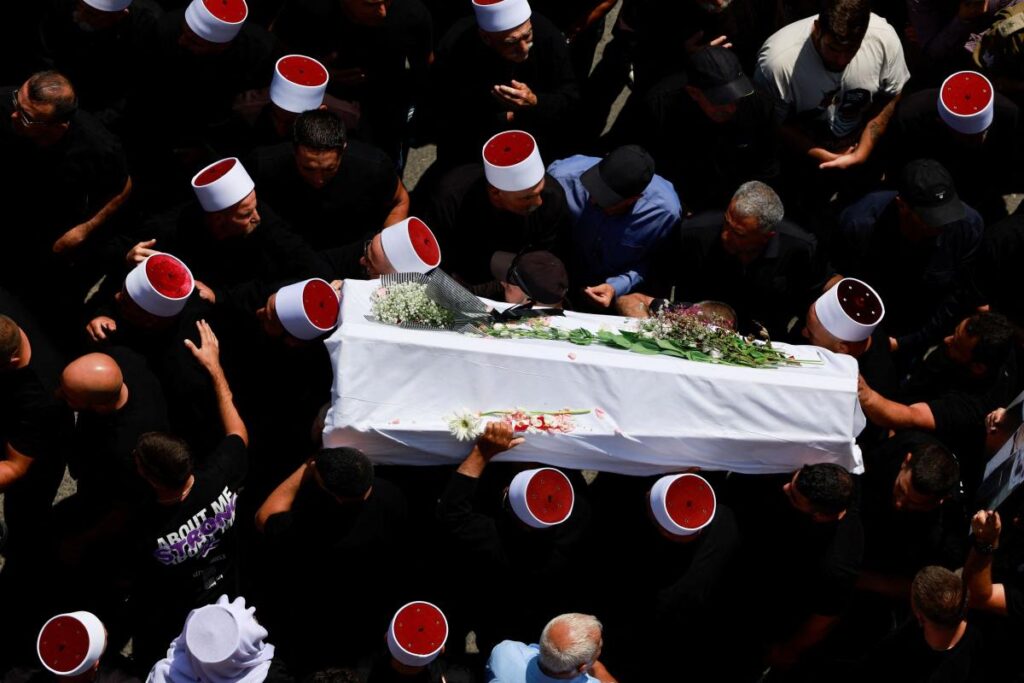Thousands of people gathered on Sunday for the funerals of children and young people killed in a rocket attack in the Israeli-occupied Golan Heights, as world leaders scrambled to contain the political fallout from the attack.
Members of the Druze community wept as they carried coffins through the streets of Majdal Shams, while some shouted angrily at ministers attending the funeral, Israeli media reported.
Israel blamed the Iranian-backed militant group Hezbollah for the attack, which killed 12 people. However, Hezbollah strongly denied carrying out the attack.
On Sunday, world leaders condemned the attack and sought to defuse tensions amid fears the incident could spark a war between Israel and Hezbollah.
In response to Saturday’s attack, the Israeli Defense Forces (IDF) carried out strikes on Hezbollah targets in Lebanese territory overnight. On Sunday, Hezbollah carried out attacks on two Israeli military bases.
Cross-border fire between the two sides has escalated since Hamas attacked Israel on October 7, sparking Israel’s military campaign in Gaza. Saturday’s attack was the deadliest loss of life in and around Israel’s northern border since October.
The strike took place on a football field in Majdal Shams, one of four towns in the Golan Heights home to about 25,000 members of the Arabic-speaking Druze religious and ethnic group.
According to the Israeli Foreign Ministry, 10 of the 12 victims were between the ages of 10 and 16. The ages of the other two victims were not released.
This embedded content is not available in your region.
Israeli Prime Minister Benjamin Netanyahu, who vowed that Hezbollah would “pay a heavy price,” arrived in Israel on Sunday after cutting short a trip to the United States. He had planned to hold a meeting with his military leaders to assess the situation and approve operational plans.
Hezbollah denied involvement in the attack but earlier on Saturday claimed responsibility for four other attacks, including one on a military base about 3 km away.
At a funeral in Majdal Shams on Sunday, weeping men wearing traditional red and white hats carried 10 of the white-covered coffins through crowded streets, AFP reported. Women dressed in black abaya robes wept as they laid flowers on the coffins. Some mourners carried large photos of the dead children.
Fadi Mahmud, 48, told AFP it was the first time Majdal Shams had suffered such a huge loss during the war.
“Our community is very close-knit. These children are just like everyone else’s children in the village,” he is reported to have said.
Anger also flared within the community during the funeral, with some directing their ire at Israeli officials in attendance, the Times of Israel reported.
“Are you coming here now? You haven’t come for ten months!” A man in military uniform reportedly shouted at Housing Minister Nir Barkat and Environmental Protection Minister Idit Silman. His remarks were met with applause.
“We are tired of your promises!” another person reportedly shouted at Finance Minister Bezalel Smotrich.
In a video posted on social media, rioters surrounded Mr. Smotrich, cursing and shouting, “We don’t want him!” according to a translation by The Times of Israel.
According to Israeli media, a leader of the Druze community is said to have written a letter requesting that government ministers not attend the funeral to prevent the tragedy from becoming a “political event.”
The Druze are part of an Arabic-speaking ethnic group that is located in Lebanon, Syria, the Golan Heights and northern Israel. In Israel, they have full citizenship rights and make up about 1.5% of the population.
But most in the Golan have retained their allegiance to Syria. They can still study and work in Israel, although only those with citizenship can vote and serve in the military.
The vast majority of the international community does not recognize Israel’s annexation of the Golan Heights from Syria in 1981.
World leaders on Sunday spoke out against the strike and warned of escalation, although they disagreed over who was responsible.
British Foreign Secretary David Lammy said in a message on X that the UK “condemns the attack on the Golan Heights, which has tragically claimed at least 12 lives” and that Hezbollah “must cease their attacks”.
“We are very concerned about the risk of further escalation and destabilisation,” said Minister Lammy.
US Secretary of State Antony Blinken said that “all indications are that the missile did indeed come from Hezbollah” but that the US does not want the conflict to escalate.
Lebanese Foreign Minister Abdallah Bouhabib told the BBC he did not think Hezbollah, which normally attacks military targets and not civilians, carried out the attack, but added: “It could be a mistake by the Israelis or by Hezbollah – I don’t know.”
The Lebanese government condemned the violence and called for a ceasefire on all fronts in a statement.

